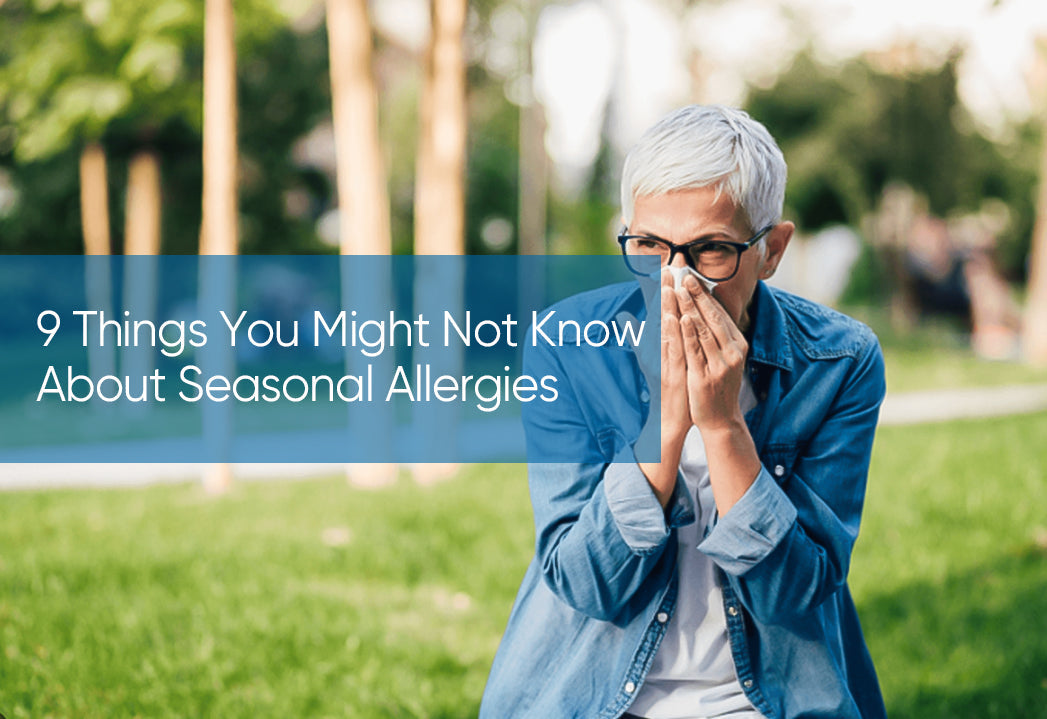
9 Things You Might Not Know About Seasonal Allergies
Seasonal allergy is no trivial condition. As spring is approaching, we are about to face a great challenge. According to the American College of Allergy, Asthma & Immunology, about 60 million people in the US suffer from seasonal allergies. However, the majority of us still have many misconceptions about seasonal allergies, although we may think we know enough about them. This article explains some common misconceptions and things you might not know about seasonal allergies. Knowing more about it makes us better prepared for the incoming challenge.
Allergies can develop at any age:
Many people think that seasonal allergies only develop among children and that if you didn’t have them in childhood, you are not likely to develop them later in life. While it is more common for seasonal allergies to develop during childhood, it is possible for them to develop at any age.
Allergies can be genetic:
If one or both of your parents have allergies, there is a higher chance that you will develop them as well. The symptoms will appear at a certain time, but it is not yet understood what can bring it out and when it may happen.
What you are allergic to may change:
Our lives are full of allergens. Seasonal allergies are typically triggered by outdoor allergens such as pollen, but they can also be triggered by indoor allergens such as pet dander or dust mites. Most importantly, what you are allergic to can change over time. Such change can take place at any stage in your life. Moreover, if you have got shot allergy shots and have developed immunity, you might still develop an allergy to what you were not previously allergic to.
Climate change can worsen allergies:
With rising temperatures, plants are producing more pollen for longer periods, leading to more severe allergy symptoms. Longer exposure to more pollen is also more likely to trigger allergies in those who never developed allergies. So don’t be surprised if you suddenly start to have allergy symptoms one day.
A new environment will not cure allergies:
A lot of people with allergy problems may consider moving to a new place where things they are allergic to don’t exist. You may experience better conditions for one year or two. But it won’t be long before you develop new allergies to what exists in the new environment. That is because allergy is the tendency of your immune system. It will show allergy symptoms as long as there are allergens, despite what the allergen is. Usually, it will choose to react to the allergen you are most exposed to. And since you can’t find a place on earth completely without allergens, your immune system will always have something to react to.
Allergies can affect your mental health:
Allergies can cause significant physical discomfort and cost you a lot of energy. Symptoms like a runny nose also prevent you from getting enough rest. Suffering from physical burdens and lack of sleep can lead to anxiety, depression, and other mental health issues.
Allergies can be mistaken for other conditions:
While sneezing, runny nose, and itchy eyes are common allergy symptoms, some people may experience fatigue, headaches, or even digestive issues. Therefore, allergy symptoms can sometimes be mistaken for other diseases. It is important to see a doctor to determine the cause of your symptoms.
Allergies can be life-threatening:
In some cases, allergies can trigger a severe allergic reaction called anaphylaxis, which can be life-threatening. Seasonal allergies can also be the trigger of asthma flare-ups. About 80 percent of children with asthma also have certain allergy problems and are more likely to have flares during allergy seasons. In addition, seasonal allergies may lead to a series of breathing problems, especially in those who have chronic respiratory diseases like COPD. If you experience symptoms such as difficulty breathing or swelling of the face or throat, seek medical attention immediately.
There are various ways to reduce allergy symptoms:
Various approaches are available for dealing with allergies. You can either prevent this from happening by reducing the exposure by using air filters, wearing masks outside, and washing your hands frequently. Or try methods for long-term allergy control like allergy shots or immunotherapy. If you are having severe breathing problems, applying oxygen therapy with an oxygen concentrator is a good choice to help with the condition by introducing supplemental oxygen.




























Leave a comment